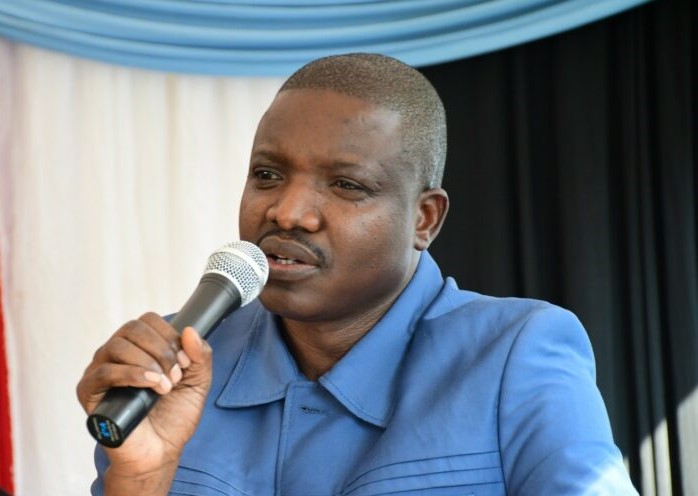
Dr. James Alic Garang, the Governor of the Central Bank of South Sudan Juba. December 17, 2023. (Photo: Madrama James/Eye Radio)
The Bank of South Sudan said it will open a branch in Nimule of Eastern Equatoria State in one month to take charge of the collection of non-oil revenue from the border.
Bank Governor Dr. James Alic Garang said the branch will be opened to increase the revenue collection.
Dr. Garang stated that all taxes on imports entering the country through Nimule border point will be remitted in the Central Bank branch.
According to him, this is because the ministries of Finance, Trade and other relevant institution have learnt that the revenue collection agencies are not generating enough money into the government coffers.
The Bank governor said the plan to open a Central Bank branch in Nimule was coined in 2019, but it was not immediately successful.
“As a governor I sent a delegation, they went there to assess the viability of Central Bank having a branch in Nimule, so when the team came, we said it is not easy to put up a branch in one day, so we have to rent a place,” he said at a joint press briefing in Juba.
“I sent the team back to go and rent a place and last week, my team gave me a timeline for us to be able to rent the place, put in the system, the power, the network, bring the computers, and everything we need for us to be operational.”
Dr. Garang said once Central Bank branch starts its operation in Nimule, it will be the only institution collecting tax, whereas the other agencies will cease preforming the role.
“Anybody importing to South Sudan will just come to Central Bank, pay their fee and then go and clear. This is one way that the government is hoping that once the bank becomes operational the revenue collection in Nimule is going to be very high.”
Meanwhile, Dr. Garang said he has given informal exchange dealers until April 2024 to register, or risk being considered illegal.
The Central Bank boss encourages the black-market dealers to register as forex or commercial banks or face the arrest after the deadline.
Dr. James said this is in an attempt to control the exchange rate in the market.
“We are reorganizing the informal market, those young people that you see on the street, selling in Juba, today they are not there anymore, because your government has made sure that no one should stand on the street and sell.”
“And now we are moving to a phase where we are telling them to register and find shops to be able to sell. In April and going forward, it is going to be illegal in this country because we have the regulations and the [guidelines].”
In early December, Dr. James Alic Garang issued a 10-day ultimatum to the black-market currency dealers operating in South Sudan to acquire licenses or risk crackdown.
Bank Governor Alic said the initiative was to meet the institution’s mandate of monitoring domestic price and bringing about financial system stability.
The South Sudanese pound has sharply depreciated against the US dollar leading to rising commodities prices in local markets.
Support Eye Radio, the first independent radio broadcaster of news, information & entertainment in South Sudan.
Make a monthly or a one off contribution.
Copyright 2024. All rights reserved. Eye Radio is a product of Eye Media Limited.